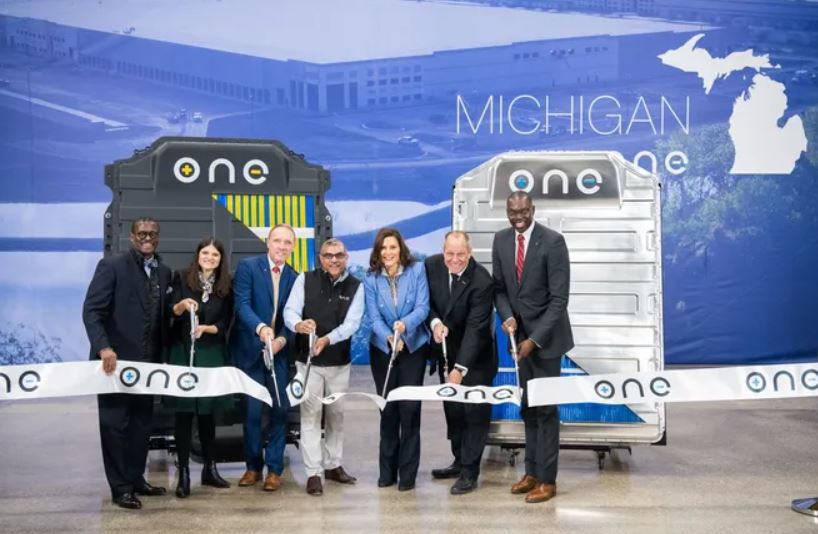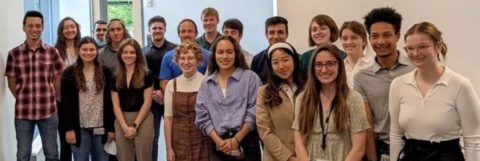Detroit Free Press
Carol Cain
Oct. 29, 2022
Make no bones about it, one of Michigan’s calling cards for competing for manufacturers of EVs, trucks, batteries and related businesses gearing up for the power revolution is our unique talent base, specifically automotive engineering and technology, which are darn near embedded in our region’s DNA.
It’s certainly something to shout out loud about as states like Ohio, Alabama and California are waving their flags, too, as they compete for these companies. Which is why leaders and organizations across Michigan are stepping up efforts to safeguard that advantage as they work to help better train, retain and anticipate talent needs.
It’ll certainly be needed when you look at the growing number of companies who announced in recent days they are setting up new operations here. I talked to a few of them and asked how our talent pipeline factored into their decision.
“Look, Michigan is the global center for the automotive industry,” said Bob Lutz, one of the industry’s quintessential cars guy who has held top jobs at GM, Ford and Chrysler. He’s serving as chairman of VIA Motors, which makes electric trucks for fleets. VIA Motors announced Oct. 25 it was moving its headquarters from Utah to Auburn Hills and, with it, 300 high-wage commercial EV jobs would be based here.
“Automotive engineering is in our blood here,” said Lutz, who lives in suburban Detroit. “It makes sense to bring VIA’s headquarters and technical facility to the center of it all and tap into the minds of the brilliant people that work here. That’s what VIA is about — no-nonsense car people with the drive and experience to get things done.”
Added Bob Purcell, CEO of VIA Motors, “Along with the wealth of experience and talent here, the area has a well-established automotive supply base with advanced capabilities to further help VIA build the best electric work trucks for fleets. Together with our advanced R & D facility in (Orem) Utah, we can effectively create and manufacture durable electric work trucks that fleets can rely on.”
Mujeeb Ijaz, founder and CEO of ONE (Our Next Energy), also gained headlines when he announced the company’s new facility where EV cells and battery packs will be assembled in Van Buren Township on Oct. 5 and held a ribbon cutting on Oct. 20.

Provided by Our Next Energy.
“One of the deciding factors was the rich pool of talent for automotive component manufacturing, supply chain management, and production quality,” Ijaz said. “We want to merge the advanced technologies needed for next generation vehicle supply with the background, know-how and experience to build great products in Michigan. ONE has the talent needed to begin this journey and we are growing every day to develop our workforce as needed.”
I heard similar talk from FLO, a Canadian maker of EV charging stations opening an assembly facility in Auburn Hills.
“Over the last decade, FLO has built one of North America’s premier charging networks and, as we enter a new era of electrification expansion, we chose Michigan in part because of its workforce,” said Cory Bullis, senior public affairs manager at FLO.
“We believe the state offers a great deal of opportunity through its diverse and abundant workforce and business-friendly environment,” Bullis added. FLO plans to hire 133 people.
Additionally, on Oct. 27, Lear Corp. announced it will open an $80 million manufacturing facility that will “provide hundreds of highly skilled jobs.”
Ray Scott, CEO of Southfield-based Lear, said in an emailed statement: “Locating this plant in the state Lear also calls home is a natural fit since Michigan workers already have the skills to build technologically advanced products that are driving the expansion of electric vehicles.”
With a growing need for more qualified employees, I asked folks in the know here about workforce issues and how they think we’re positioned.
“The talent issue and shortage is of extreme importance to business and to Michigan’s future,” said Chris Holman, CEO of Michigan Business Network. His organization conducts a survey of 600 firms, with his latest finding talent the second most vital issue (after inflation). “At the same time, the enthusiasm for the future and next 12 to 24 months remains strong,” Holman said.
Glenn Stevens Jr., executive director of MichAuto, an automotive and mobility advocacy group started in 2007 that became part of the Detroit Regional Chamber in 2012, has been promoting the industry and region.

Provided by Carolyn Sauer.
“There are always talent gaps and needs in the workforce supply chain,” Stevens said. “These gaps exist in manufacturing, skilled trades, and advanced engineering and software development. How we close these gaps and meet needs will determine the trajectory of Michigan’s economy.”
Stevens added, “Today’s industry demands more software engineers, coders, data scientists, and digital employee talent from the factory floor to the connected car. It’s essential we continue to develop and protect our advanced manufacturing base, but the state’s economic growth will come from increasing the knowledge-based jobs that spur innovation, research, engineering, and software development.“
When asked what he considers the top concern, Stevens said: “Develop and retain more of our own young professionals here in Michigan. We continue to lose far too many of our graduates to other regions of the country. Additionally, more jobs require digital skills, and it is imperative that we align our education and training institutions with this reality.”
With that in mind, the state is investing $10 million on a new marketing effort focused on attracting and retaining talent to fill in-demand and high-growth jobs. On Oct. 25, the Michigan Strategic Fund board approved those funds, which will be coordinated by the Michigan Economic Development Corp. The focus of the campaign is yet to be determined but will include messages geared to people in Michigan, as well as out of state.
“We view talent marketing as both critical to our ability to do business attraction but it is also something that we need to do to be supporting the Michigan businesses here in our state,” said Michelle Grinnell, MEDC’s senior vice president of marketing and communications. “Every state candidly is working to try to solve the talent question. The states that win that battle are going to have a really strong competitive advantage moving forward.”
MEDC has also been working with Ann Arbor SPARK to administer a statewide internship program pairing Michigan students with companies to provide better networking and opportunities for both companies and future employees. The Michigan STEM Forward internship program just placed it 500th student and results are promising. Of the students that have participated in SPARK’s internship program the past five years, 84% accepted jobs in Michigan upon graduation.
“In addition to providing students with resume-building experiences, the MI STEM Forward program handles the administrative portion of hiring the interns, such as tax forms and paperwork, as well as underwriting 50% of the intern’s wages — up to $3,000 for a full-time intern,” said Ben Ernst, who runs the Michigan Stem Forward program. “While it is available to Michigan companies that have a STEM-focused internship opportunity, we’ve found it provides the most relief to smaller and early-stage companies that may not have budget or personnel to facilitate this process.”
Ernst added, “We’re pleased this program helps companies find, recruit and hire STEM students from across the state. These kinds of internship opportunities are filling gaps in the workforce and helping students move forward exponentially in their careers.”

